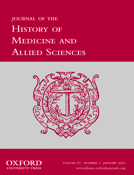-
Views
-
Cite
Cite
Tracey Loughran, Shell Shock, Trauma, and the First World War: The Making of a Diagnosis and Its Histories, Journal of the History of Medicine and Allied Sciences, Volume 67, Issue 1, January 2012, Pages 94–119, https://doi.org/10.1093/jhmas/jrq052
Close - Share Icon Share
Abstract
During the First World War, thousands of soldiers were treated for “shell shock,” a condition which encompassed a range of physical and psychological symptoms. Shell shock has most often been located within a “genealogy of trauma,” and identified as an important marker in the gradual recognition of the psychological afflictions caused by combat. In recent years, shell shock has increasingly been viewed as a powerful emblem of the suffering of war. This article, which focuses on Britain, extends scholarly analyses which question characterizations of shell shock as an early form of post-traumatic stress disorder. It also considers some of the methodological problems raised by recasting shell shock as a wartime medical construction rather than an essentially timeless manifestation of trauma. It argues that shell shock must be analyzed as a diagnosis shaped by a specific set of contemporary concerns, knowledges, and practices. Such an analysis challenges accepted understandings of what shell shock “meant” in the First World War, and also offers new perspectives on the role of shell shock in shaping the emergence of psychology and psychiatry in the early part of the twentieth century. The article also considers what relation, if any, might exist between intellectual and other histories, literary approaches, and perceptions of trauma as timeless and unchanging.




